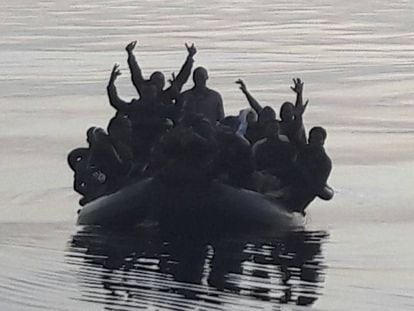The double ordeal faced by female migrants on the Strait of Gibraltar
12,400 migrants arrived in Spain by way of the Mediterranean between January and September, 50% more than in all of 2016. Women are a minority, but their journey is the most difficult. Three women tell their story
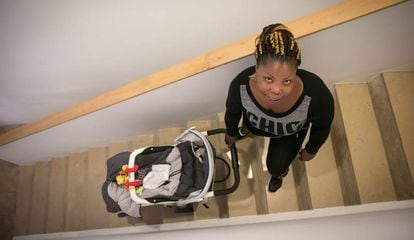

“You do not know if you will arrive or not, and you get on the boat aware of that,” confesses Patricia, a 30-year-old from Ivory Coast who boarded a speedboat in northern Morocco last August with her seven-year-old twins and nothing in her pockets, except for the hope of getting to Spain alive.
“I would never do it again, never!” she exclaims between sobs in a park in Jerez de la Frontera, in southern Spain, where she lives in an apartment provided by the non-profit Accem, a refugee support group. She says that she had never thought of emigrating to Europe, much less getting on a boat with 31 other people at the mercy of the sea. Like her, more than 12,400 migrants arrived in Spain between January and September of this year, according to the United Nations. This is the highest figure since 2008 and 50% more than in all of 2016. In addition to sub-Saharan Africans, Moroccans are among the nationalities with the largest presence.
According to experts, the reasons behind the increase in arrivals include unrest in the Rif region of Morocco, the agreement between Rome and Tripoli, and a possible relaxation in surveillance by Moroccan authorities. Yet migratory pressure is still far from what it was in 2006, when 30,000 migrants arrived in the Canary Islands. This year alone, 100,000 have arrived in Italy.
The maritime route between Morocco and Spain is not new. This itinerary was traditionally used by Moroccans, but instability in Central African countries have pushed thousands of sub-Saharan Africans to venture down the same path. Although women are in the minority (around 9% on this route), their journey is more difficult. “They are exposed to many abuses, from theft to kidnapping or trafficking,” says Elvira García, a social worker for Accem in Jerez de la Frontera.
Patricia, Bahoumou and Esther recounted their odysseys on the road that brought them here.
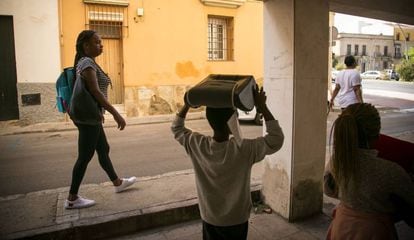
PATRICIA: A six-year trip through eight countries
Patricia tells her story of fleeing the Ivory Coast in 2011 “for the safety of her daughter,” who was a baby at the time. The same year the civil war began, she crossed into Ghana and Burkina Faso to reach Mali. When she thought she’d be able to rebuild her life there, another conflict broke out that once again forced her to leave. Through Senegal and Mauritania, she entered Morocco.
García explains that young women, alone and with young children, are increasingly making these journeys. In the past, Nigerians formed the bulk of the female migration to Spain, but this year they have been replaced by women from Cameroon and the Ivory Coast. “We have to create safe roads, because a girl alone with a nine-month-old child, both in Africa and here, is putting herself at risk,” she explains.
Patricia describes the three years of “slavery” she lived through in Casablanca. As a black, undocumented and Catholic woman in a Muslim country that looks suspiciously at sub-Saharan migrants, she soon understood that the possibilities of building a future in Morocco were very limited.
She went to Tangier and paid €2,000 to cross the 14 kilometers of sea that separate Africa from Europe. “Before getting on [the boat] you have to go through the forest, where you are attacked and women are raped ... and men are as well,” she says. She was rescued after 10 hours of being lost at sea. “A Spanish fishing boat showed us the way,” she says. Half an hour later, a helicopter was flying overhead.
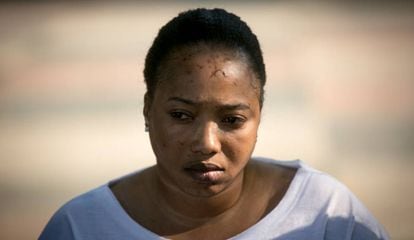
BAHOUMOU: The capsized boat aired on TV
Bahoumou arrived in Spain on April 10 in an non-motorized boat that sailed with 33 people from the Moroccan city of Nador. Her arrival to the Iberian Peninsula was “aired on TV” because the boat capsized and three people drowned.
According to the International Organization of Migration, at least 138 people died in the western Mediterranean this year. “The 2000-2003 season was the hardest, there were very large boats of up to 80 people,” says Israel Diaz, supporter of the Salvamar Arcturus organization, which sends out rescue teams. Smaller boats that pose a higher risk at sea, but are more difficult to catch via surveillance, have been a main mode of transportation since then, but this year larger rafts with more capacity have made a comeback.
Bahoumou left Ivory Coast in 2013 with her newborn son. She traveled through Mali and Mauritania until she reached Morocco. “If you do not have money, you have to sleep with all the men who take you along the way,” says the 33-year-old woman, who now shares an apartment with Patricia.
Her son got on a boat in March and has since been stranded in Melilla. Two weeks later, Bahoumou got on a barge that she thought was also going to Melilla.
Bahoumou says she was deceived; the barge never went to Melilla. After several requests to recover custody of her son, last week the European Court of Human Rights requested that the Spanish government take measures to reunite the mother and child. Thanks to this mediation, Bahoumou was able, for the first time in eight months, to speak on the phone with her son.
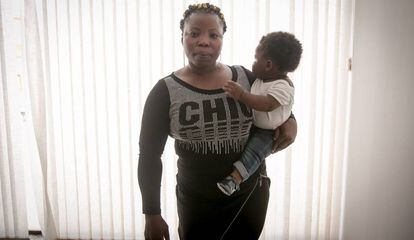
ESTHER: Crossing while seven months pregnant
Esther and her husband left Nigeria in 2012 with the clear goal of reaching Europe. “My family had no money and they told me it was a good place to live,” she says. It took nine months to cross Benin, Mali and Algeria by bus to reach Morocco.
“Sometimes we slept in the desert for days... if you did not hide you were raped, beaten and robbed,” says this 30-year-old woman.
After four years in Rabat, she considered returning to Nigeria because of the difficulties she faced there. “But I realized I was pregnant and I did not want my son to be born in Morocco, and in my country there is a lot of suffering,” she explains. She paid €1,700 and went to Nador. Within a week, while seven months pregnant, she was squeezed onto a boat with 32 other people.
Greatness was born in Seville last December. Now they live in Algeciras, a port city in the south of Spain, in a room provided by the White Cross Foundation.
Life in Europe is not as easy as she had been told. “I do not have documents or a job,” she complains. Blessing, the mediator who accompanies her, reminds her to not get discouraged. “It has not gone badly for her: she’s alive!” she exclaims. Blessing also knows what it means to emigrate. She came to Spain 14 years ago, also by sea.
English version by Debora Almeida.

